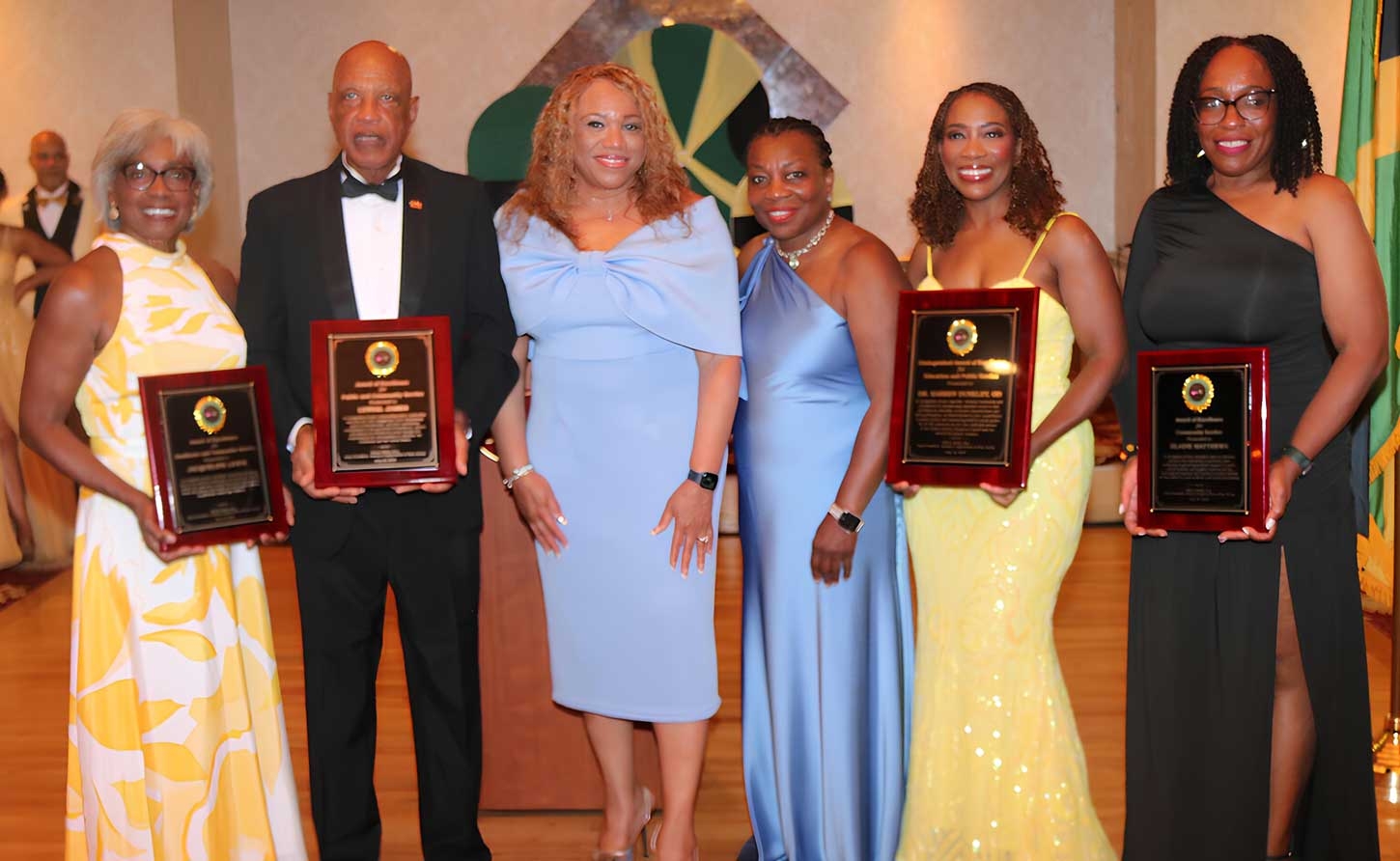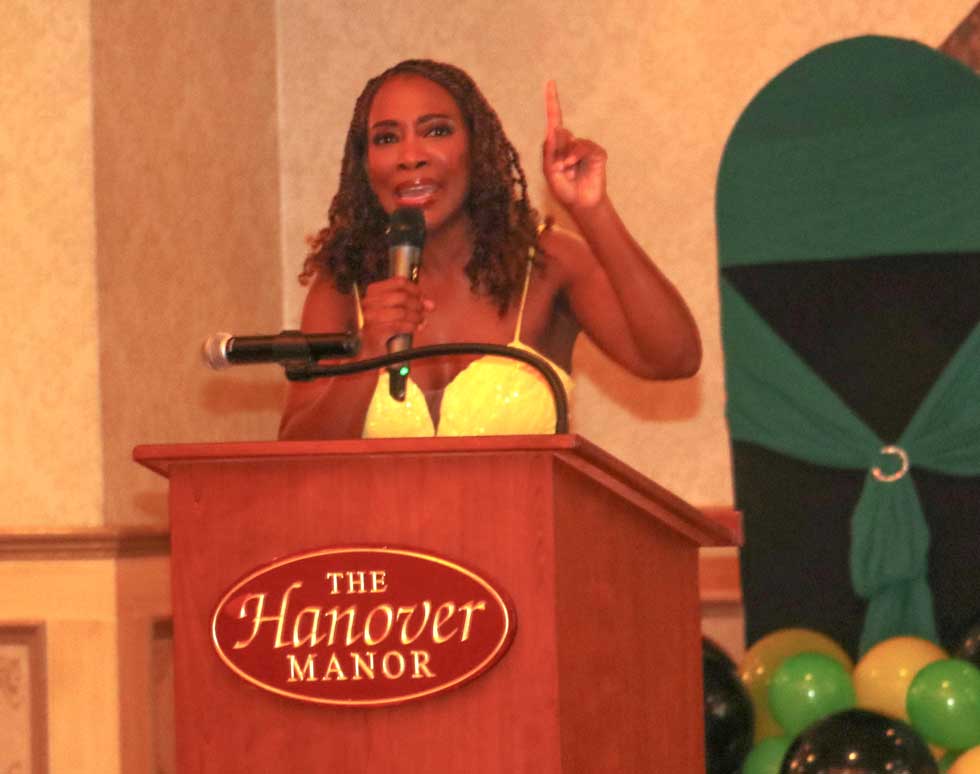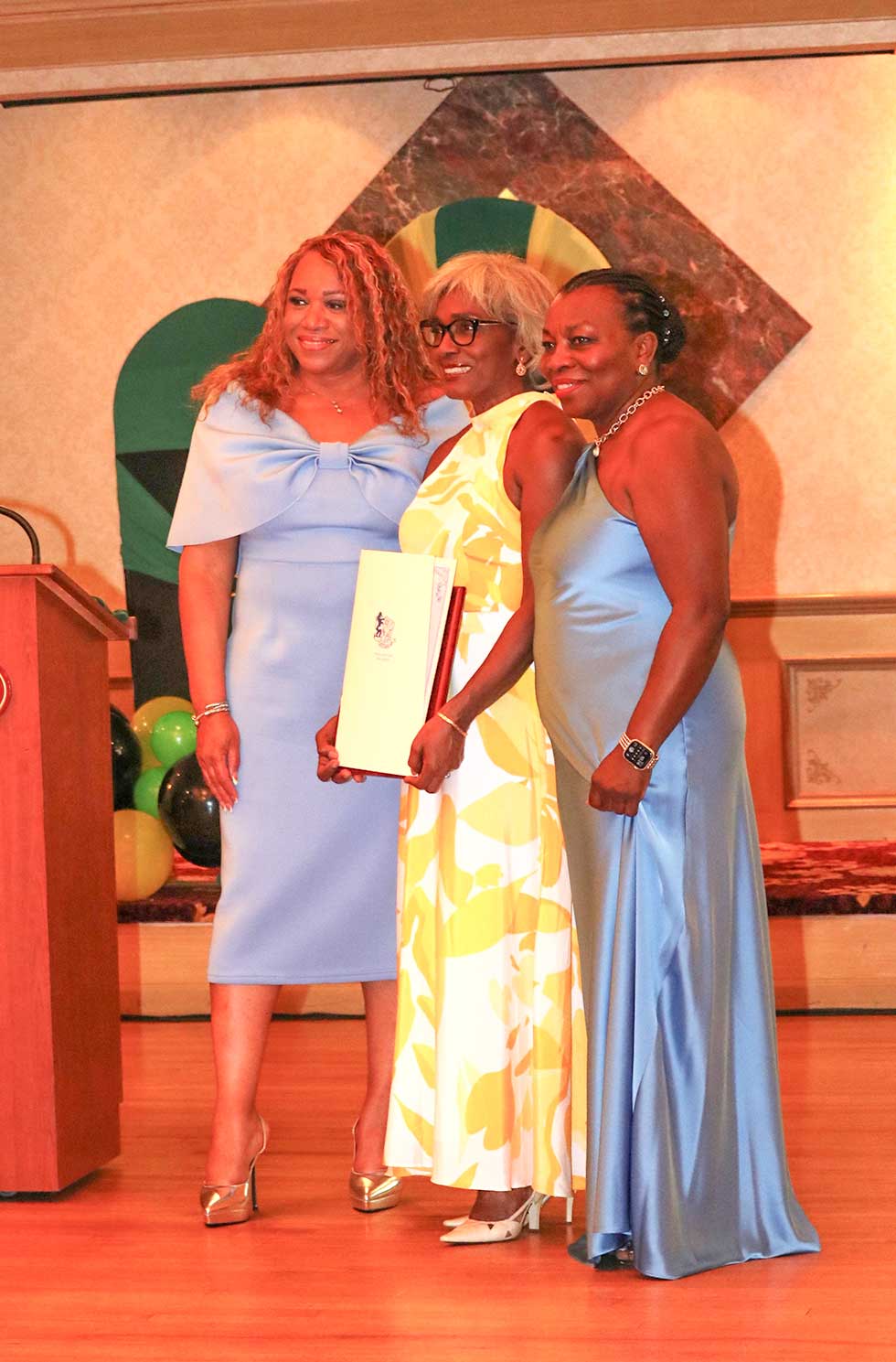DIASPORA | New Jersey Recognises Caribbean Excellence and Diaspora Engagement

EAST HANOVER, New Jersey, July 20, 2025 – Derrick Scott. - Four distinguished Jamaican Americans received dual recognition for their outstanding contributions as Highland Park Mayor Elsie Foster partnered with the Jamaica Organization of New Jersey (JON-) to celebrate excellence within the diaspora community.
The joint recognition ceremony, held during JON-J's annual Awards of Excellence and Independence Gala on July 19 at Hanover Manor in East Hanover, New Jersey, saw Mayor Foster present citations to four honorees whose work exemplifies the bridge-building spirit between Jamaican heritage and American community service. The celebration marks Jamaica's 63rd year of independence, which will be observed on August 6.
The handshake between Highland Park Mayor Elsie Foster and Dr. Karren Dunkley at Hanover Manor in East Hanover on July 19, represented more than ceremonial politeness—it marked a quiet revolution in how American municipalities engage with their Caribbean diaspora communities.
As Mayor Foster who hails from Dee-Side in Trelawny, presented official citations alongside the Jamaica Organization of New Jersey's traditional awards, she validated a model of integration that transcends the usual cultural celebration framework.
The Municipal Validation Strategy
Mayor Foster's participation signals a sophisticated understanding of diaspora value that extends far beyond cultural diversity rhetoric.
Municipal governments increasingly recognize that Caribbean diaspora communities bring measurable assets: entrepreneurship rates exceeding national averages, healthcare advocacy addressing systemic gaps, and civic engagement traditions that strengthen local democratic participation.
This partnership model challenges traditional assumptions about immigrant integration. Rather than requiring cultural assimilation, East Hanover’s approach validates the bridge-building capacity that emerges when cultural identity strengthens rather than weakens civic contribution.
The result is institutional recognition that diaspora communities offer unique problem-solving perspectives precisely because they maintain homeland connections.
Studies consistently show that Caribbean diaspora members invest heavily in both their adopted communities and countries of original dual engagement that creates leaders capable of navigating complex institutional relationships and cultural translation. Mayor Foster's citations formalize this understanding at the municipal level.
Honest Heritage, Stronger Bonds

Her frank assessment of Jamaica's challenges—from healthcare system strain to literacy concerns—exemplified how honest engagement strengthens rather than weakens heritage connections.
"Our healthcare system is strained. AIDS cases are on the rise, with over 30,000 people infected—approximately 50% of whom are unaware of their status," she told the assembled community, refusing the comfortable distance of diaspora romanticism.
Yet her message balanced sobering realities with genuine optimism about Jamaica's debt reduction, impressive stock exchange performance, and unmatched global cultural influence.
This nuanced analysis demonstrates how diaspora leaders maintain credible homeland engagement while building trust within American institutional frameworks.
The sophistication of this approach stands in sharp contrast to either uncritical homeland celebration or complete cultural abandonment. Instead, it represents mature diaspora engagement that strengthens both heritage connections and civic integration.
Four Models of Excellence

Lynval James, as JON-J co-founder, represents civic engagement traditions that translate Caribbean community responsibility into American political participation. His recognition validates leaders who understand both systems and create institutional bridges.
Jacqueline Lewis's healthcare advocacy demonstrates how culturally competent community leadership addresses systemic barriers that mainstream institutions often miss. Her award acknowledges the vital role that immigrant community leaders play in building trust between diverse populations and institutional structures.
Elaine Matthews represents grassroots activism that forms the backbone of sustainable diaspora organizations. Her dedication illustrates how individual service commitment creates foundations for broader organizational impact and community development.
Dr. Dunkley's educational and public service contributions, combined with her former role as Northeast USA diaspora representative, embody the policy expertise that emerges when academic training meets lived diaspora experience.
Institutional Evolution
JON-J's 27-year journey from community organization to municipally recognized institution reflects broader patterns in Caribbean diaspora development. The organization's founding in 1998 represented traditional cultural preservation instincts, but Mayor Foster's participation validates its evolution into an institutional bridge capable of translating cultural values into civic contribution.
This institutional maturity suggests that successful diaspora organizations demonstrate value through sustained community building rather than episodic cultural celebration. Highland Park's recognition acknowledges organizations that maintain cultural identity while contributing meaningfully to American civic life.
"Their dedication to service, both here in the USA and in Jamaica, reminds us that wherever we are in the world, we carry the heart of our homeland with us and can make a difference," noted Valerie Bailey, Esq., JON-J's Board President, articulating the dual citizenship model that municipal recognition now validates.
A Template for Tomorrow
As Jamaica's 63rd Independence approaches, the East Hanover ceremony establishes a replicable template for municipal-diaspora partnerships that celebrate shared values while honoring distinct cultural contributions. The four honorees, bearing both organizational awards and municipal citations, demonstrate that excellence in service flows naturally from cultural pride rather than despite it.
This model suggests that successful diaspora integration creates leaders capable of navigating multiple institutional frameworks while maintaining authentic heritage connections—precisely the bridge-building capacity that strengthens both diaspora communities and their adopted homes.
-30-
